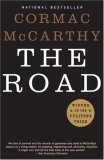The Road Less Traveled
 I am suspicious of artists who refuse interviews. Cormac McCarthy is one of those artists, a recluse who conspicuously hides a greater mystery. It is this game which mirrors many of the behaviors of McCarthy’s characters; the plain spoken, often silent loner who finds comfort in fate rather than options. It’s a cowboy cleverness where intellect and method are concealed by lack of conversation and aloneness. And that would all be fine if McCarthy were not a writer, practicing a medium which utilizes language, our primary form of communication in order to share experiences and knowledge.
I do not suggest there is some Freudian explanation for the bleak landscapes and bleaker characters in McCarthy’s writing, rather that it takes an artist of great depth to strip life bare and reveal its essence. His prose mirror his personal lifestyle. They are barren, absent any unnecessary punctuation or flourish. The writing suggests the environment its author occupies, the desert southwest. If Cormac McCarthy were a visual artist he’d be Donald Judd. There is no redemption in his writing and unlike Faulkner or Hemingway, his characters are absent obvious personal vices or poetics. McCarthy’s protagonists are sociopathic, driven by an internal demeanor that embodies misanthropy. In a rare interview with the New York Times in 1992 McCarthy laid bare his personal philosophy;
I am suspicious of artists who refuse interviews. Cormac McCarthy is one of those artists, a recluse who conspicuously hides a greater mystery. It is this game which mirrors many of the behaviors of McCarthy’s characters; the plain spoken, often silent loner who finds comfort in fate rather than options. It’s a cowboy cleverness where intellect and method are concealed by lack of conversation and aloneness. And that would all be fine if McCarthy were not a writer, practicing a medium which utilizes language, our primary form of communication in order to share experiences and knowledge.
I do not suggest there is some Freudian explanation for the bleak landscapes and bleaker characters in McCarthy’s writing, rather that it takes an artist of great depth to strip life bare and reveal its essence. His prose mirror his personal lifestyle. They are barren, absent any unnecessary punctuation or flourish. The writing suggests the environment its author occupies, the desert southwest. If Cormac McCarthy were a visual artist he’d be Donald Judd. There is no redemption in his writing and unlike Faulkner or Hemingway, his characters are absent obvious personal vices or poetics. McCarthy’s protagonists are sociopathic, driven by an internal demeanor that embodies misanthropy. In a rare interview with the New York Times in 1992 McCarthy laid bare his personal philosophy;
"There's no such thing as life without bloodshed," McCarthy says philosophically. "I think the notion that the species can be improved in some way, that everyone could live in harmony, is a really dangerous idea. Those who are afflicted with this notion are the first ones to give up their souls, their freedom. Your desire that it be that way will enslave you and make your life vacuous."*
In McCarthy’s latest book The Road, for which he has won the Pulitzer Prize, he has pushed the novel to the edges of sparseness. It is reminiscent of Ad Reinhardt’s blue-black monochromes but empty their immensity. The Road is a post-apocalyptic fever dream, but no one is asleep. It shuns anything representative of dreamscapes or surrealism often attributed to portentous narratives. It provides virtually no backstory either. It centers monolithically on the simple metaphor of the road and the singular determination of one man’s doomed relationship with his son. Humanity is seen reverting to its lowest common denominator, desperate violence. The perspective is flattened into a grey wash of ash, soot infested snow and cold rain. It’s not the grayness of ambiguity you feel with Beckett, it is closer in pallor to Camus, focused on the linear psychosis of love, rather than hate.
For all of the emptiness in his prose, his narration, and his life, McCarthy’s The Road relies to heavily on classical melodrama. As in cheap horror films where the music portends the arrival of evil acts, The Road too easily preys on our shared fears. Like so many post-apocalyptic stories before it, it suggests that human kindness lives within the rare person who stands alone against the remnants of society turned diseased, cruel, ugly and violent. We are to assume that humanity is simultaneously eating its own while one man (not woman) resists the same disintegration, in blind allegiance to his love for his son. If love is what makes us compassionate why is it assumed it is so readily transcended when confronted with oblivion? The man and boy in The Road are resourceful, determined and persistent, then why is it that everyone else has gone mad (with few exceptions) and turned into mindless packs of cannibals? The novel is cold to a fault. It leads you in a determined linear path exploiting our fear of oblivion, of self destruction and McCarthy’s supposition we are all misanthropes like him. It is reminiscent of clichéd nouvelle cuisine, an immaculate white plate adorned with the sparest portion and the simplest preparation. Unfortunately, The Road offers no sensuous flavors as reward but merely burnt scraps. It is the persistence of the American Puritan myth, that hard scrabble, determination and resistance to sensuous pleasures is the only path to righteousness. It is precisely this myth, reinforced in The Road that will inevitably lead us to the apocalyptic outcome it portrays.
* Richard B. Woodward, Cormac McCarthy's Venomous Fiction, (The New York Times, April 19, 1992).
